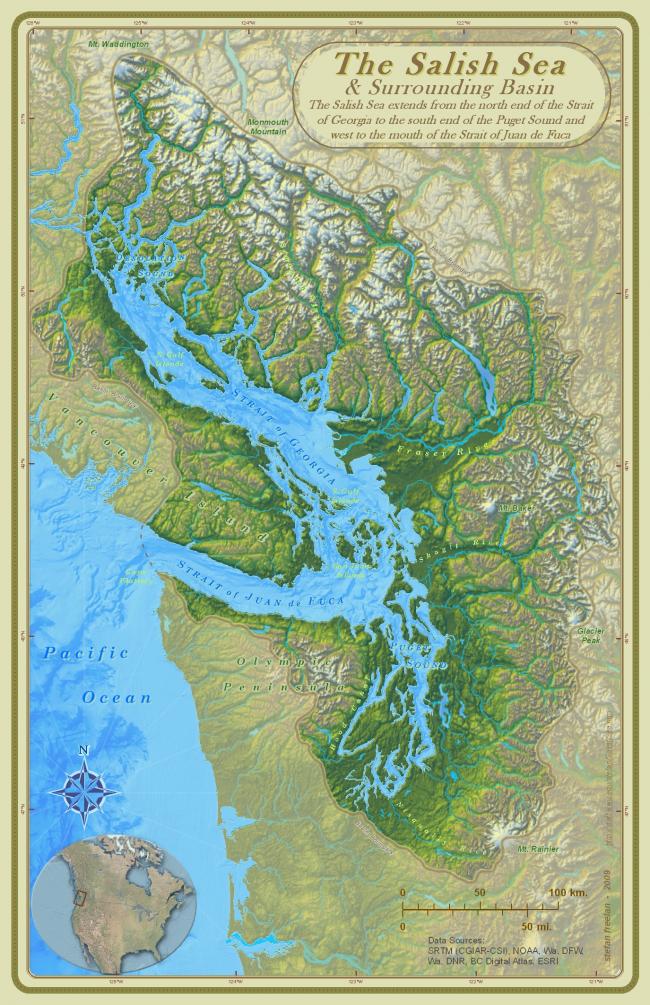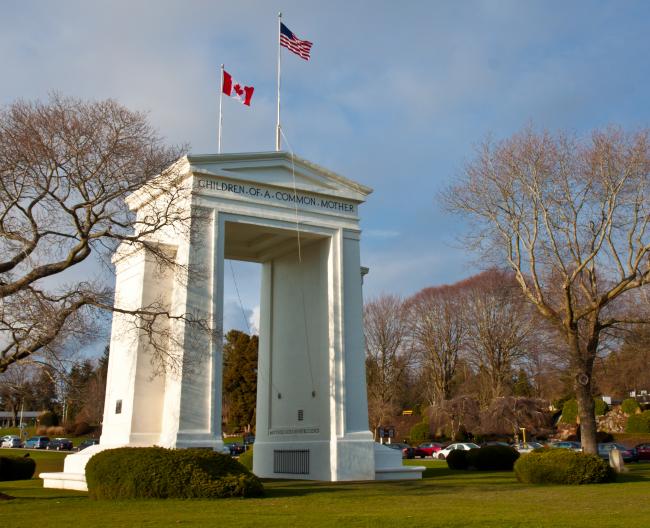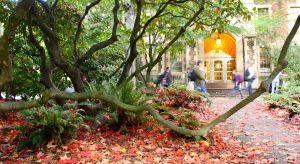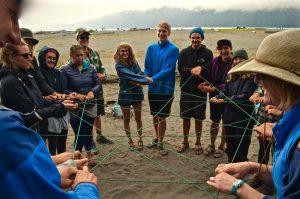
Salish Sea Institute
The mission of the Salish Sea Institute is to foster responsible stewardship of the Salish Sea, inspiring and informing its protection for the benefit of current and future generations.
The Institute:
- promotes dialogue and partnerships among people, organizations and agencies throughout First Nations and tribal communities, Washington State, and British Columbia
- serves as the administrative home of the Salish Sea Ecosystem Conference
- hosts gatherings to cultivate collaborative governance and protection of the Salish Sea
- develops place-based curriculum, research and events for students to explore the environment, history and communities of the Salish Sea
- fosters a sense of place and raise awareness of the value of the Salish Sea and the issues that threaten its health

Border Policy Research Institute
The Border Policy Research Institute (BPRI) at Western Washington University is a multidisciplinary institute that undertakes research to inform policy-makers on matters related to the Canada–United States border, particularly in the Cascadia region.
Priority focus areas include:
- Border management
- Economic relationships
- Cross-border mobility
- Cross-border collaboration
Western Washington University established the BPRI in 2005 after September 11th transformed border relations and security. The BPRI continues to promote research, academic programs, and public programming on critical policy issues affecting border crossings between British Columbia and Washington State. We work closely with cognate programs at the university and collaborate with many public and private entities throughout the region.

UW Canadian Studies Center
For more than twenty years, the Pacific Northwest National Resource Center on Canada (NRC), formed by the University of Washington and Western Washington University, has been awarded Title VI support by the U.S. Department of Education in recognition of its leading role as a center of excellence on Canada. Located near the Canadian border and animated by an expanding web of cross-border academic and business linkages, the NRC has developed strong specializations in trade, security, Arctic foreign policy, Indigenous self-determination, and environmental management.
The Canadian Studies Center is one of eight Title VI Centers in the Henry M. Jackson School of International Studies at the University of Washington, where teams of renowned scholars conduct cutting-edge research on global issues. The NRC combines comprehensive undergraduate and K-16 outreach programs with exceptional graduate training and specialized research in many professional schools. As secretariat for the Pacific Northwest Canadian Studies Consortium, the NRC also serves almost fifty colleges and universities in the region. The NRC mission is to increase the number of scholars, educators and professionals knowledgeable about Canada in the Pacific Northwest and across the nation.

Redfish School of Change
The Redfish School of Change: Now in its 11th year, this five-week intensive program will take a cohort of 10 Canadian and 10 U.S. students to a number of outdoor classrooms in the Salish Sea. Students will engage in coursework with and in community focusing on policy development, programming, and activism within the Salish Sea. The program will start with a canoeing adventure and finish with a hiking trip. Students should expect to have weekends off and be in class from 9-5pm, Monday to Friday, but have most weekends off – other than when on trips. For more info, click here.
Redfish School of Change Program Objectives and Overview
The overall program objectives are as follows. Individual course objectives are included in individual course syllabi.
Students will be able to demonstrate:
- A recognition of some Indigenous resurgence processes in and around the interior Salish communities.
- The capacity to develop effective strategies for a broad range of social and environmental challenges.
- An appreciation for pluralism in ways of knowing and among scientific and cultural perspectives toward creating social change.
- The capacity and confidence to employ leadership skills for effective community action.
- The ability to participate collaboratively in finding solutions for social and environmental challenges.
- An appreciation the relevance of place — and the features that distinguish regional and local contexts and thus approaches to social and environmental change.
- A renewed focus on environmental hope and imagining positive futures.
Each of the courses in the Redfish School of Change will be taught by a lead instructor (or instructor team). Students from the University of Victoria will receive credit through their home institution, and students from Western Washington University will receive credit through their home institution.
Students are expected to have housing in their home community during this course. You will be staying there most evenings when we are on campus and it will be a place to go on weekends.
The course schedules, instructors and course numbers are as follows:
Community Building and Leadership in the Salish Sea
Main instructors: Dr. Nick Stanger (WWU) and Joy Beauchamp (WWU)
UVic: ES 370 Community Building and Leadership in the Salish Sea (1.5 credits)
WWU: ENVS 437/SALI 437* Community Building and Leadership in the Salish Sea (5 credits)
Centering Indigenous Futures in the Salish Sea
Instructor: TBD – Indigenous instructor from Coast Salish territories
UVic: ES 380 Centering Indigenous Futures in the Salish Sea (1.5 credits)
WWU: ENVS 437/SALI 437* Centering Indigenous Futures in the Salish Sea (5 credits)
Ecology and Hope in the Salish Sea
Instructors: Dr. Elin Kelsey, University of Victoria
UVic: ES 381 Ecology and Hope in the Salish Sea (1.5 credits)
WWU: ENVS 437/SALI 437* Ecology and Hope in the Salish Sea (5 credits)
